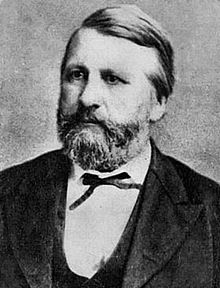Robert Ould
|
Colonel Robert Ould |
|
|---|---|
 |
|
| Born |
January 31, 1820 Georgetown, Washington, D.C. |
| Died | December 15, 1882 (aged 62) Richmond, Virginia |
| Place of burial | Hollywood Cemetery Richmond, Virginia |
| Allegiance |
|
| Service/branch |
|
| Years of service | 1862–1865 (CSA) |
| Rank |
|
| Commands held | Commissioner of Exchange |
| Battles/wars | American Civil War |
Robert Ould (January 31, 1820 – December 15, 1882) was a lawyer who served as a Confederate official during the American Civil War. From 1862 to 1865 he was the Confederate agent of exchange for prisoners of war under the Dix–Hill Cartel. After the war he became a member of the Virginia General Assembly and was later elected president of a railroad company.
Ould was born in Georgetown, Washington, D.C., on January 31, 1820. After attending Jefferson College in Pennsylvania, he graduated in letters at Columbian College in D.C. in 1837, and in law at William & Mary College in 1842. During the antebellum period he worked as a lawyer in Washington, and in 1855 he was appointed under Franklin Pierce to a commission to codify the district's laws.
In 1859, following the shooting of Philip Barton Key II, Ould was appointed by James Buchanan to succeed Key as United States Attorney for the District of Columbia. Ould charged Key's killer, Daniel E. Sickles, with murder, but lost the case after Sickles' lawyer (and future United States Secretary of War) Edwin M. Stanton invoked one of the first uses of the temporary insanity defense in U.S. history.
...
Wikipedia
